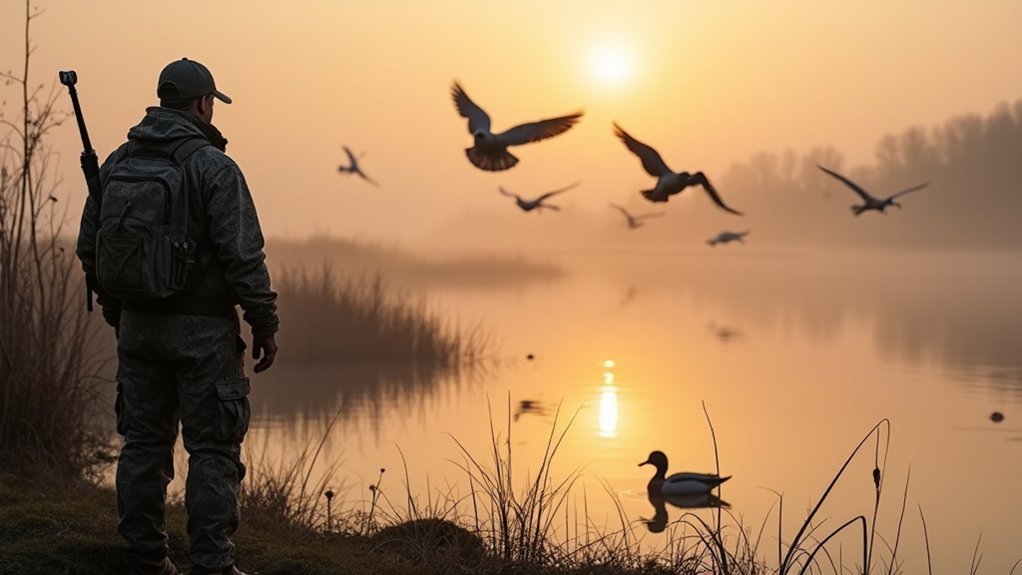If you’re looking to improve your duck hunting game, understanding the key techniques can make a significant difference. From mastering calling methods to strategically using decoys, every aspect plays a role in your success. You’ll also want to contemplate your shooting stance and timing. But there’s more to it than just that. Let’s explore what really sets successful hunts apart and how you can elevate your skills this season.
What is Duck Hunting and Why is it Popular?
Duck hunting is an exhilarating outdoor activity that combines skill, strategy, and a deep appreciation for nature.
It’s a chance for you to immerse yourself in serene environments, often surrounded by stunning landscapes and vibrant wildlife. This pursuit appeals to many because it not only challenges your abilities but also fosters camaraderie among fellow hunters.
The thrill of tracking and calling ducks adds excitement, while the satisfaction of a successful hunt can be rewarding.
Furthermore, participating in this activity supports conservation efforts, helping to maintain healthy ecosystems.
Ultimately, duck hunting connects you to nature and creates lasting memories with friends and family.
How to Prepare for Duck Hunting Season
As you gear up for duck hunting season, preparing properly is essential to guarantee a successful and enjoyable experience.
Start by scouting your hunting area. Familiarize yourself with local regulations and verify you have the necessary licenses.
Check your shooting skills; practice at the range to build confidence. Review your calling techniques, as effective calls can attract ducks.
Maintain your hunting dog’s training and conditioning, if applicable.
Finally, discuss strategies and safety protocols with your hunting partners.
What Gear Do You Need for Successful Duck Hunting?
When preparing for a successful duck hunting trip, having the right gear can make all the difference. Start with a reliable shotgun, ensuring it’s suited for waterfowl. Bring appropriate ammunition, typically larger shot sizes like #2 or #4.
Waterproof clothing is essential to stay warm and dry, along with insulated boots. Don’t forget your waders for trudging through marshes. A good set of decoys and a sturdy blind will help attract ducks.
Finally, pack essential accessories like a hunting knife, binoculars, and a first-aid kit. With this gear, you’ll be well-equipped for a productive and enjoyable outing.
How to Choose the Right Duck Calls
How can you guarantee your calls effectively mimic the sounds of ducks? First, consider the type of duck you’re targeting. Different species have distinct calls, so choose a call specifically designed for them.
Next, test various materials like polycarbonate or wood; each offers unique tones. It’s essential to practice regularly to refine your technique. Listen to recordings of real ducks to understand their cadence and pitch.
Finally, don’t hesitate to seek advice from experienced hunters or attend workshops. A well-chosen call, paired with practice, can greatly increase your chances of attracting those elusive ducks during the hunt.
Where are the Best Locations for Duck Hunting?
Finding the best locations for duck hunting is essential to your success, especially during migration seasons.
Look for wetlands, lakes, and rivers, as these areas attract ducks seeking food and shelter. Focus on spots with abundant vegetation and shallow waters, where ducks can easily forage.
Nearby agricultural fields can also be productive, particularly during harvest times when grains are exposed.
Don’t forget to scout your chosen area ahead of time to spot where ducks are landing and feeding.
Pay attention to weather patterns, as changes can shift duck behavior and movement, helping you identify prime hunting locations.
What Techniques Improve Your Duck Hunting Success?
Scouting the right locations sets the stage, but mastering specific techniques can greatly boost your duck hunting success.
First, practice your calling skills; a realistic call can lure ducks in. Use decoys strategically to create an inviting scene, mimicking their natural behavior.
Additionally, consider your shooting stance and aim for accuracy; a stable position improves your shot. Timing’s vital, too; early mornings and late afternoons yield better results.
Finally, stay patient and remain as still and quiet as possible. With these techniques in your arsenal, you’ll increase your chances and enjoy a more rewarding hunting experience.
Happy hunting!
How to Enhance Your Duck Hunting Skills
Improving your duck hunting skills can elevate your experience and success in the field. To sharpen your abilities, focus on these key areas:
- Practice calling: Spend time mastering different duck calls to mimic various species.
- Scout locations: Familiarize yourself with potential hunting areas, noting where ducks congregate.
- Enhance your setup: Invest in quality decoys and learn effective placement techniques to attract ducks.
- Stay informed: Keep up with local hunting regulations and best practices to improve your overall approach.
Why You Should Adopt Ethical Hunting Practices
While hunting can be an exhilarating experience, adopting ethical practices is essential for preserving the sport and its environment. By following regulations, you protect wildlife populations and their habitats, ensuring future generations can enjoy the thrill of hunting.
Ethical hunting respects the animals you pursue; it’s about making clean shots and minimizing suffering. It also fosters a positive image of hunters within the community, promoting conservation efforts.
Plus, hunting ethically builds your reputation as a responsible sportsman. Remember, your actions today shape the future of hunting tomorrow, so embrace ethical practices for a sustainable and rewarding experience in the field.
